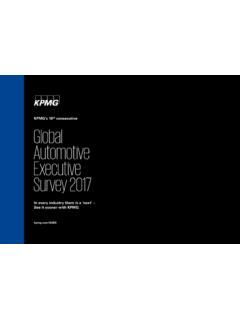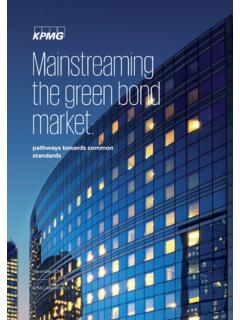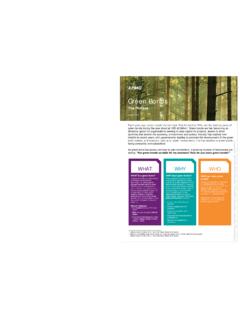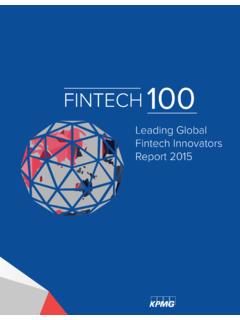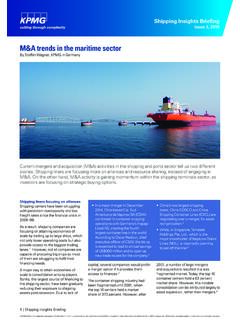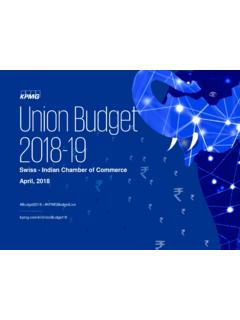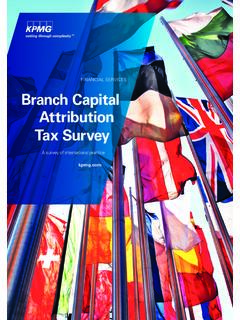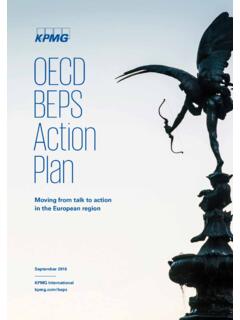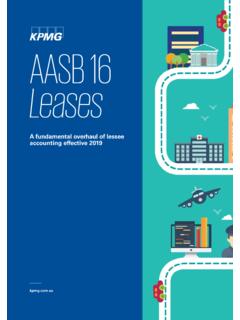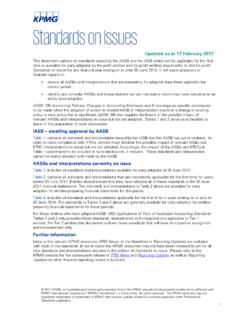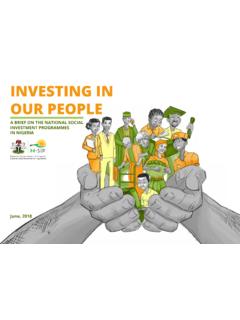Transcription of Investing in South Africa and Africa - KPMG | US
1 Investing in South Africa and Africa and South Africa 2 Overview of the African economic environment 4 Investments between China and South Africa 8 Considerations for investment in Africa / South Africa 10 Legal 10 Taxation 10 Exchange control 10 VAT 10 Statutory obligations on employers 10 Mining and infrastructure 12 Mining 12 Infrastructure 13 KPMG in Africa 16 KPMG in South Africa 18 KPMG Services 20 ForewordAfrica is a continent whose time has come and while the opportunities are almost self-evident and tangible, they are there primarily for the bold, the agile and the swift.
2 At KPMG we understand this. We also understand that you re probably reading this because you re looking for a professional services provider to walk this road with you for audit, tax and advisory services who is where you are or where you want to be. Someone who you can work with, built on a relationship of trust and mutual respect, able to cut through the complexities to help you achieve your strategic objectives simply and decisively. Our commitment to Africa speaks volumes. We began our journey several years ago and have continuously upped the ante to stay ahead of the game anticipating change, actively seeking to recruit and retain the best available talent, and consistently Investing in our people , our infrastructure and our professional service offerings to better serve our clients in numerous respects.
3 Two years ago, we established for the first time a singular Executive Committee for KPMG Africa , enabling responsibility with authority. What all of this means to you, our client, is that KPMG is positioned to serve you across Africa , with the full benefit of KPMG s global can be assured of the same levels of professional service, practical understanding and relevant insights from us across the continent regardless of where your business operations are located. We know that you expect this of us and we are confident of our delivery. This is good for our business, grows our people and allows us to extend our positive reach into the communities in which we co-exist. All of this fosters an ethos of a long-term, sustainable, responsible business, which is what we believe Africa the leadership of our Africa Board, we have a clearly articulated strategy that is focused on seven key business priorities.
4 These include delighting our clients, maintaining global consistency, operating as one across Africa and inspiring our people , who are motivated and equipped to serve you. Looking very much at the world outside our own allows us to focus on Africa as you see it and your related needs, and not based on our own structures. This flexibility offers further advantages to our clients in mobilising our teams and further simplifies how we may help you. Centred on the premise of consistent service delivery, I invite you to read in this brochure more about the context of Africa today, KPMG s extraordinary value proposition, our positioning in Africa and something about what we re doing to shape a positive future for the continent and all its people . Importantly, we ve included the details for our China- Africa Corridor, inviting you to contact any of our people .
5 I am excited about the many possibilities that Africa presents to all of us. I am even more excited about how KPMG can work with you, across Africa , in mutually rewarding engagements that add value, bringing to the fore the benefits of the full reach of KPMG s global network with local resources who understand you and the markets in which you Kgosana Chairman and Senior Partner, KPMG Africa Limited Chief Executive, KPMG in South Africa1 | Africa and South Africa | 2 AfricaWhy invest in Africa ? One of the key reasons that Africa has been a focus region for investors is its current and potential economic growth. According to African Economic Outlook, the African economy is expected to grow at percent in 2012. In the world s ten fastest-growing economies list published by The Economist and the International Monetary Fund (IMF), six of these economies are African.
6 Such high growth has created enormous business opportunities on the continent and thereby attracted investors Return on investment in Africa is higher than in developed countries The continent is rich in natural resources such as gold, platinum-group metals, copper, etc It is largely an untapped market, with low penetration and great potential The burgeoning size of the African market and growing urbanisation. South AfricaWhy invest in South Africa ? South Africa has been admitted as the newest member of BRICS It is the gateway to the African Continent South Africa has the most advanced infrastructure on the continent The World Bank Survey on the Ease of doing business ranks South Africa higher than any of the other BRICS countries It has some of the world s largest reserves of some key minerals such as gold Since its first free elections in 1994, South Africa has held numerous free and fair elections at the national.
7 Provincial and local government level It s macro-economic policies have been recognised by global institutions South Africa has a well-developed and first world banking and financial services systems It s natural beauty featuring a world in one country A diverse and developed agricultural sector Virtually no restriction on the areas of Africa Population million Land area million km Population density 41 pop/km Source: African Economic OutlookGo South , young manWorld s ten fastest-growing economies*Annual average GDP growth, %2001 - 2010 2011 - 2015 * Excluding countries with less than 10m population and Iraq and Afghanistan 2010 estimate IMF forecastSources: The Economist, IMF3 | Overview of the African economic environment | 4 Overview of the African economic environment1 Home to approximately 1 billion people , Africa has been referred to as the continent whose time has come.
8 Before the global economic downturn of 2009, the majority of African economies had enjoyed notable economic growth. Average annual growth in 2006-08 amounted to about 6 percent, while the Gross Domestic Product (GDP) per capita grew by almost 4 percent. The growth can be ascribed to a combination of favourable factors, some of which include: high commodity prices growth in export volumes generally sensible macro policies debt relief sustained aid Foreign Direct Investment (FDI) towards more market-friendly economic policies have also aided in the promotion of growth. The world economic crisis brought this period of relatively high African growth to an abrupt end. However, although the African economy has also been negatively impacted by the global economic downturn, the continent has, on average, maintained positive economic growth.
9 Due to the relatively low degree of integration of African banks with international financial markets, the impact of the global economic downturn on Africa has taken place through various other transmission mechanisms, some of which include: the collapse of commodity prices, which impacted the mining sector the reduction in export volumes, impacting the manufacturing sector the decline of workers remittances due to job losses or wage declines the decline of FDI due to a reduction of the investments of global firms, in particular in the mining and tourism sectors. On the positive side, donor countries have generally maintained their aid commitments and disbursements to Africa , despite substantial fiscal pressures at home, and debt relief has reduced debt service costs and helped African countries to better cope with the crisis.
10 It appears that the African economy has been more resilient to the global crisis than other emerging economies, with the exception of those in Asia, notably China and India. The effect of the crisis, although less severe than on most other continents, was nonetheless significant. The global expansion remains unbalanced during 2011. Growth in many advanced economies is still weak, with the growth in most emerging and developing economies continuing to be strong. Overall, the global economy expanded at an annualised rate of percent in the first quarter of 2011, and growth forecasts for 2011-12 are broadly unchanged, with offsetting changes across various economies. However, greater than anticipated weakness in US activity and renewed financial volatility from concerns about the depth of fiscal challenges in the euro area periphery, pose greater downside risks.
